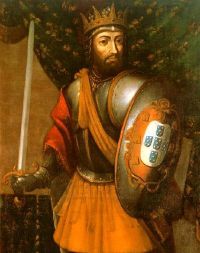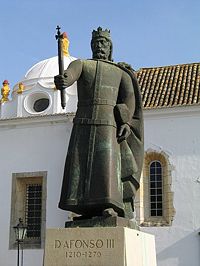Afonso III
| Afonso III | ||
|---|---|---|
| King of Portugal and the Algarves (since 1249) | ||

| ||
| Seventeenth century painting of Afonso III. | ||
| Reign | July 24, 1245 (as Regent) January 4, 1248 â February 16, 1279 | |
| Full name | Afonso of Portugal | |
| Titles | Infante of Portugal (1210â1248) Count Consort of Boulogne (1238â1253) Defender/Visitator/Curator of the Kingdom (1245â1248) | |
| Born | May 5, 1210 | |
| Coimbra, Kingdom of Portugal | ||
| Died | February 16, 1279 | |
| Portugal Alcobaça, Kingdom of Portugal | ||
| Buried | Monastery of Alcobaça, Alcobaça, District of Leiria, Portugal | |
| Predecessor | Sancho II of Portugal | |
| Heirs first cousin daughter second son third son |
Infanta Sancha of León (1248â1259) Infanta Branca (1959â1260) Infante Fernando (1260â1262) Infante Dinis (future Denis I) (1262â1279) | |
| Successor | Denis of Portugal | |
| Consort | Matilda II, Countess of Boulogne (1248â1253) Beatrice of Castile (1253â1279) | |
| Issue | Infante Roberto (1239) Infanta Branca (1259â1321) Infante Fernando (1260â1262) Infante Dinis (future Denis I) (1261â1325) Infante Afonso, Lord of Portalegre (1263â1312) Infanta Sancha (1264âc. 1302) Infanta Maria (1264â1304) Infanta Constança (1266â1271) Infante Vicente (1268â1271) | |
| Royal House | Capetian House of Burgundy | |
| Father | Afonso II of Portugal | |
| Mother | Infanta Urraca of Castile | |
Afonso III, King of Portugal (Portuguese pron. IPA [É'fõsu]; rare English alternatives: Alphonzo or Alphonse), or Affonso (Archaic Portuguese), Alfonso or Alphonso (Portuguese-Galician) or Alphonsus (Latin), the Bolognian (Port. o Bolonhês) or the Brave (Port. o Bravo), the fifth King of Portugal (May 5, 1210 in Coimbra â February 16, 1279 in Alcobaça, Coimbra or Lisbon) and the first to use the title King of Portugal and the Algarve, since 1249. He was the second son of King Afonso II of Portugal and his wife, Urraca, princess of Castile; he succeeded his brother, King Sancho II of Portugal on January 4, 1248.
As the second son of King Afonso II of Portugal, Afonso was not expected to inherit the throne, which was destined to go to his elder brother Sancho. He lived mostly in France, where he married Matilda, the heiress of Boulogne, in 1238, thereby becoming Count of Boulogne. In 1246, conflicts between his brother, the king, and the Catholic church became unbearable. Pope Innocent IV then ordered Sancho II to be removed from the throne and be replaced by the Count of Boulogne. Afonso, of course, did not refuse the papal order and left Boulogne for Portugal. Since Sancho was not a popular king, the order was not hard to enforce; he was exiled to Castile and Afonso III became king in 1248 after his brother's death. To ascend the throne, he abdicated from his office as Count of Boulogne and later (1253) divorced Matilda.
| Afonso Henriques (Afonso I) |
|---|
|
| Sancho I |
|
| Afonso II |
|
| Sancho II |
| Afonso III |
|
| Denis |
|
| Afonso IV |
|
| Peter I |
|
| Ferdinand I |
|
| Beatrice (disputed queen) |
|
Determined not to commit the same mistakes as his brother, Afonso III paid special attention to what the middle class, composed of merchants and small land owners, had to say. In 1254, in the city of Leiria, he held the first session of the Cortes, a general assembly comprising the nobility, the middle class and representatives of all municipalities. He enacted laws intended to restrain the upper classes from abusing the least favored part of the population. Remembered as a noteworthy administrator, Afonso III founded several towns, granted the title of city to many others and reorganized public administration throughout his kingdom.
Reconquest
Secure on the throne, Afonso III then proceeded to make war with the Moor communities that still thrived on the southern Iberian Peninsula. In his reign the Algarve became part of the kingdom, following the capture of Faro. Portugal thus became the first Iberian kingdom to complete its Reconquista.
Following his success against the Moors, Afonso III had to deal with the political situation and border dispute with Castile. The neighboring kingdom considered the newly acquired lands of the Algarve should be Castilian, not Portuguese, which led to a series of wars between the two kingdoms. Finally, in 1267, a treaty was signed in Badajoz, which determined that the southern border between Castile and Portugal should be the River Guadiana.
Marriages and descendants
Afonso's first wife was Matilda II of Boulogne, daughter of Renaud, Count of Dammartin, and Ida of Boulogne. She had two sons (Roberto and an unnamed one), but both died young. He divorced Matilda in 1253 and, in the same year, married Beatrix of Castile, illegitimate daughter of Alfonso X, King of Castile, and Maria de Guzman.
| Name | Birth | Death | Notes |
|---|---|---|---|
| By Matilda II of Boulogne (c. 1202-1262; married in 1216) | |||
| Infante Roberto (Robert) | 1239 | 1239 | Â |
| By Beatrix of Castile (1242-1303; married in 1253) | |||
| Infanta Branca (Blanche) | February 25, 1259 | April 17 1321 | Abbess of the Convent of Huelgas |
| Infante Fernando (Ferdinand) | 1260 | 1262 | Â |
| Infante Dinis (Denis) | October 9, 1261 | January 7, 1325 | Succeeded him as Denis, 6th King of Portugal. Married Infanta Isabel of Aragon. |
| Infante Afonso | February 8, 1263 | November 2 1312 | Lord of Portalegre. Married to Violante Manuel of Castile (daughter of Juan Manuel of Castile). |
| Infanta Sancha | February 2, 1264 | c. 1302 | Â |
| Infanta Maria | November 21, 1264 | June 6, 1304 | Nun in the Convent of Saint John in Coimbra. |
| Infanta Constança (Constance) | 1266 | 1271 |  |
| Infante Vicente (Vincent) | 1268 | 1271 | Â |
| By Madragana (Mor Afonso) (c. 1230-?) | |||
| Martim Afonso Chichorro | c. 1250 | c. 1313 | Natural son; Married Inês Lourenço de Valadres. |
| Urraca Afonso | c. 1260 | ? | Natural daughter; Married twice: first to D. Pedro Anes de Riba Vizela, second to João Mendes de Briteiros |
| By Maria Peres de Enxara (?-?) | |||
| Afonso Dinis | c. 1260 | a. 1310 | Natural son; Married to D. Maria Pais Ribeira, Lady of the House of Sousa. |
| Other natural offspring | |||
| Leonor Afonso | c. 1250 | 1291 | Natural daughter. Married twice: first to D. Estevão Anes de Sousa (without issue), second to D. Gonçalo Garcia de Sousa, Count of Neiva (without issue). |
| Gil Afonso | 1250 | December 31, 1346 | Natural son; Knight of the Order of the Hospital. |
| Fernando Afonso | ? | ? | Natural son; Knight of the Order of the Hospital. |
| Rodrigo Afonso | 1258 | about May 12, 1272 | Natural son; Prior of the city of Santarem. |
| Leonor Afonso (nun) | ? | 1259 | Natural daughter; Nun in the Monastery of Santa Clara of Santarem. |
| Urraca Afonso | 1250 | November 4, 1281 | Natural daughter; Nun in the Monastery of Lorvão. |
| Henrique Afonso | ? | ? | Natural son; Married to Inês (last name unknown). |
Ancestors
| Afonso III of Portugal | Father: Afonso II of Portugal |
Father's father: Sancho I of Portugal |
Father's father's father: Afonso I of Portugal |
| Father's father's mother: Maud of Savoy | |||
| Father's mother: Dulce Berenguer of Aragon |
Father's mother's father: Ramon Berenguer IV, Count of Barcelona | ||
| Father's mother's mother: Petronila of Aragon | |||
| Mother: Urraca of Castile |
Mother's father: Alfonso VIII of Castile |
Mother's father's father: Sancho III of Castile | |
| Mother's father's mother: Blanca of Navarre | |||
| Mother's mother: Leonora of England |
Mother's mother's father: Henry II of England | ||
| Mother's mother's mother: Eleanor of Aquitaine |
Legacy

Afonso III was the fifth king of Portugal and reigned from 1248 until 1279. He is best remembered for completing the reconquest of the West of the Iberian peninsula, that is, of Portugal, and for the style of his government. At a time when many kings saw themselves as ruling more or less by divine right, Afonso III was prepared to share responsibility for governing Portugal. He convened the first ever meeting of a Portuguese Parliament, the Cortes, in which common citizens as well as aristocrats took part. Afonso III appears to have had a genuine concern for the welfare of his most vulnerable subjects, recognizing that they had human rights. Those who helped Alfonso III regain political control of the whole of the Algarve, the southernmost portion of Portugal and helped in the reconquest now felt that they too deserved recognition, despite their not being members of the social elite. Afonso III's contribution to the development of more participatory, egalitarian governance was modest although remarkable for his era. His consideration of his peoples sowed seeds that bore fruit of democracy in Portugal's later history.
| House of Burgundy Cadet Branch of the Capetian dynasty Born: 5 May 1210;Â Died: 16 February 1279 | ||
|---|---|---|
|
| ||
| Preceded by: Sancho II |
King of Portugal 1248 â 1279 |
Succeeded by: Denis |
| Preceded by: Moorish rulers |
King of the Algarves 1249 â 1279 | |
| ||||||||||||||||||||
ReferencesISBN links support NWE through referral fees
- Amaral, Diogo Freitas do. D. Afonso Henriques: biografia. Colecção Figuras de todos os tempos, 3. Lisboa: Bertrand Editora, 2000. ISBN 9722511572
- Anderson, James Maxwell. The History of Portugal. The Greenwood histories of the modern nations. Westport, Conn: Greenwood Press, 2000. ISBN 9780313311062
- Marques, Antonio Henrique R. de Oliveira. History of Portugal. New York: Columbia University Press, 1972. ISBN 9780231031592
- Mattoso, José. D. Afonso Henriques. Lisboa, Portugal: Circulo de Leitores, 2006. ISBN 9789724238678
- This article incorporates text from the Encyclopædia Britannica Eleventh Edition, a publication now in the public domain.
Credits
New World Encyclopedia writers and editors rewrote and completed the Wikipedia article in accordance with New World Encyclopedia standards. This article abides by terms of the Creative Commons CC-by-sa 3.0 License (CC-by-sa), which may be used and disseminated with proper attribution. Credit is due under the terms of this license that can reference both the New World Encyclopedia contributors and the selfless volunteer contributors of the Wikimedia Foundation. To cite this article click here for a list of acceptable citing formats.The history of earlier contributions by wikipedians is accessible to researchers here:
The history of this article since it was imported to New World Encyclopedia:
Note: Some restrictions may apply to use of individual images which are separately licensed.
